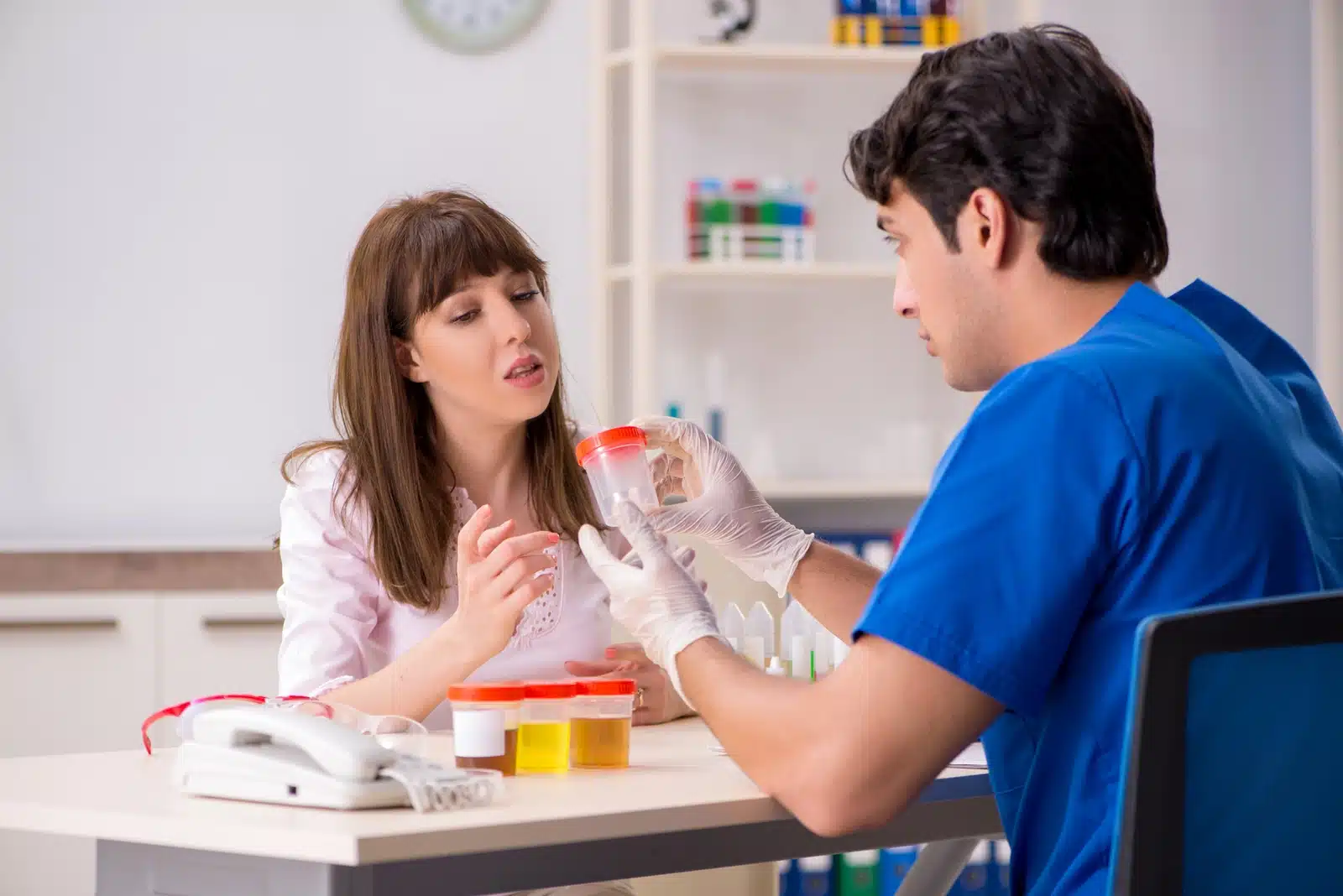Addiction | 5 min read
Drug Testing in the Workplace: What To Know
Medically Reviewed By

On July 22, 2025
Written By

On June 25, 2019

What you will learn
- Drug and alcohol testing can take many forms, including pre-employment screening, post-incident or reasonable suspicion testing, or random drug testing at work.
- Employers have a range of testing methods at their disposal depending on their goals, legal requirements, and industry regulations.
- Testing types include urine, hair, saliva, blood, sweat patch, and breath testing.
- Workplace drug testing helps prevent accidents, protects employees, and ensures high performance.
Drug use isn’t limited to dark street corners or rebellious teens. In fact, many working professionals struggling with addiction hold high-pressure jobs that demand peak performance, leading to substance abuse. Increasingly, employers are implementing drug testing programs in the workplace to ensure safety, maintain productivity, and promote a drug-free culture.
Drug and alcohol testing can take many forms, including pre-employment screening, post-incident or reasonable suspicion testing, or random drug testing at work, so it’s important to understand what they are and how they may affect you.
Common Workplace Drug Testing Methods
Employers have a range of testing methods at their disposal depending on their goals, legal requirements, and industry regulations. Here are the most common types of drug tests in the workplace:[1]
- Urine testing: The most widely used testing method, urine tests detect drug metabolites that have accumulated in the body over the past few days. Urine tests are inexpensive, accessible, and reliable within a specific window.
- Hair testing: Hair tests can detect drug use for up to 90 days, but this window depends on hair length, drug type, and frequency of use. Standard 1.5-inch hair samples represent approximately 90 days, assuming average hair growth of 0.5 inches per month. Hair testing can’t indicate recent use or intoxication levels, however, and is expensive.
- Saliva testing: Effective for detecting recent drug use. Saliva testing is non-invasive and difficult to tamper with, so it’s a popular choice for random employee drug testing.
- Blood testing: Provides real-time detection of drugs present in the bloodstream with high accuracy. Blood testing is used in specific circumstances like post-accident investigations, emergency care, or criminal justice settings. However, it is rarely used in routine workplace drug testing due to its invasive nature and high cost.
- Sweat patches: Rarely used, but can detect continuous drug use over several days.
- Breath testing: Commonly used for detecting alcohol use through devices like breathalyzers.
Why Employers Conduct Drug Testing at Work
Workplace drug testing isn’t just about enforcement. It helps prevent accidents, protects employees, and ensures high performance. Employers implement drug testing policies for several reasons:
- Safety: Drug use impairs judgment, coordination, and reaction time, which can lead to accidents, especially in high-risk jobs that involve heavy machinery or healthcare.
- Liability reduction: A drug-related incident on the job can leave a business vulnerable to legal claims, workers’ compensation, or insurance disputes.
- Productivity: Employees working under the influence are more likely to make mistakes, perform poorly, and create a toxic work environment.
- Compliance: Certain industries, such as transportation, aviation, and construction, require drug-free workplaces for employee and public safety.
Circumstances That Often Involve Drug Testing
Pre-Employment Drug Testing
Pre-employment drug screening is often required in industries where safety is a top priority, such as healthcare, construction, transportation, and manufacturing. Testing before hiring new employees ensures that all new hires or job applicants are capable of performing their duties without the risk of drug abuse and impairment.
Random Drug Testing at Work
Random drug testing in the workplace is a deterrent to drug use. Unlike regularly scheduled testing, random tests are unannounced and unbiased, making it harder for employees to prepare and avoid detection. Employers use this method to maintain a drug-free environment, minimize workplace accidents, and protect their reputation.
Post-Accident and Safety-Sensitive Testing
When a workplace accident occurs, post-accident drug testing can determine if drugs or alcohol were contributing factors. Post-accident drug testing is typically recommended as soon as possible, ideally within a few hours, particularly if blood or saliva tests are used to assess current impairment. For urine testing, the window may extend to 24–32 hours, depending on the drug.
Similarly, safety-sensitive positions, such as those held by drivers, doctors, nurses, machine operators, and pilots, require ongoing monitoring through regular or random drug testing.[2] The intent is to prevent impaired people from causing harm to themselves or others.
Athletic and Institutional Testing
Professional and collegiate athletic organizations implement anti-doping programs to deter the use of both performance-enhancing and recreational drugs. However, policies vary by sport and level, and not all athletes are tested routinely.[3] Many academic programs also include drug testing requirements for students pursuing careers in nursing, medicine, or law enforcement.
Laws and Regulations Governing Workplace Drug Testing
Drug testing in the workplace is regulated at both the federal and state levels.
- The Drug-Free Workplace Act requires certain federal contractors and grantees to maintain drug-free workplaces.[4] The Department of Transportation (DOT) also mandates testing for safety-sensitive positions.
- State laws can vary, with some states limiting when and how employers can test. For example, some states have specific privacy and consent requirements that must be met for testing.
- Employee rights regarding drug testing vary by state law and employment context. However, in many cases, individuals may have the right to receive notice, access test results, and contest positive outcomes, particularly in states with employee protection statutes or unionized workplaces. The Americans with Disabilities Act (ADA) may protect employees who are in recovery from a substance use disorder or who use prescription medications lawfully. However, it does not protect individuals currently engaging in illegal drug use or using controlled substances unlawfully.[5]
What Happens If You Test Positive at Work?
A positive drug test in the workplace can be a serious concern. You may face termination or legal action, especially if there was property damage or injury.
However, if you struggle with substance abuse, there is a chance at recovery. Substance use disorders (addiction) are treatable. If you’ve tested positive for drugs on the job, talk to your HR department. Many workplaces offer confidential support or referral services for employees seeking substance abuse treatment.
At Ascendant New York, we are a team of medical professionals dedicated to evaluating your individual needs and guiding you toward a full recovery. We are located in the heart of Manhattan and assist in providing a safe and comfortable environment for those seeking freedom from substance abuse and substance-use triggers. We have designed a customized detoxification program for each patient and closely monitor their progress throughout the program. In our care, you get multidimensional support through our professional support system, which includes experienced counselors, care providers, facilities, doctors, and an in-house professional chef. We also help educate you on the reasons behind drug addiction and ways to counter any temptation towards using them in the future.
We are conveniently located in the heart of Manhattan for easy access.
Are you or a loved one struggling with substance abuse and seeking drug or alcohol addiction treatment in CT or NY? Our New York treatment facility is a safe, comfortable facility to break free from addiction and begin your life of sobriety.
Prepare for Workplace Drug Testing
Drug testing in the workplace plays a vital role in maintaining safety, accountability, and performance. If you’re facing random drug testing, looking at a pre-employment screening, or preparing for a career with regular drug testing, the presence of substances can impact your career. Don’t wait to get the help you need. Take the first step today.
Frequently Asked Questions about Workplace Drug Testing
Employer drug tests can vary, but most test for commonly used drugs like cocaine, opioids, marijuana, methamphetamine, amphetamine, and phencyclidine (PCP). Some employers may have more sophisticated tests that look for additional drugs, such as MDMA, benzodiazepines, alcohol, and barbiturates.
Many employers rely on urine drug testing because it can accurately detect a wide range of substances, is relatively inexpensive, and is minimally invasive.
Yes, failing a drug test can make it more challenging to get a job in the future, particularly at the same company or in highly regulated industries. However, the circumstances around your drug use matter, so taking accountability and seeking help for any substance abuse can help you move past a failed test.
Take Control of Your Recovery
Our team is here to guide you with compassionate, evidence-based support. Connect with Ascendant New York today.
Ascendant New York Editorial Guidelines
Here at Ascendant New York, we understand the importance of having access to accurate medical information you can trust, especially when you or a loved one is suffering from addiction. Find out more on our policy.
[1] Drug testing: Occupational medicine: Uchealth: Denver & Colorado. UCHealth. (2025, January 23). https://www.uchealth.org/services/employer-solutions/occupational-medicine/drug-testing/
[2] Drug testing for safety and security-sensitive industries. SAMHSA. (n.d.). https://www.samhsa.gov/substance-use/drug-free-workplace/employer-resources/safety-security-sensitive
[3] FAQs about drug testing and penalties. NCAA.org. (n.d.). https://www.ncaa.org/sports/2014/3/25/frequently-asked-questions-about-drug-testing.aspx
[4] Employer Resources: Drug Testing Federal Laws and Regulations. SAMHSA. (n.d.-b). https://www.samhsa.gov/substance-use/drug-free-workplace/employer-resources/federal-laws
[5] The ada: Your responsibilities as an employer. US EEOC. (n.d.). https://www.eeoc.gov/publications/ada-your-responsibilities-employer




